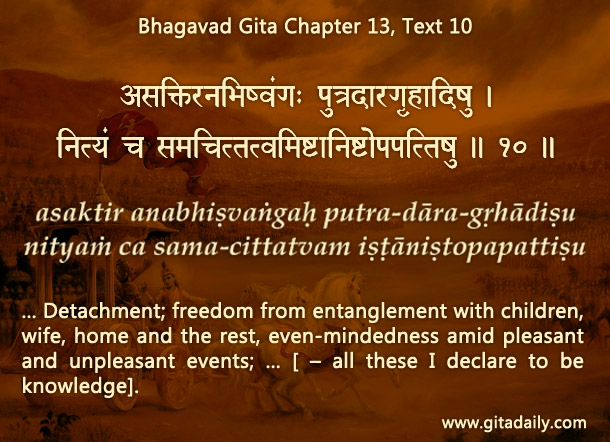Some people think that detachment sentences us to emotion-less living.
Actually, the cause of an emotionally barren existence is not detachment per se, but the worldview underlying that detachment. Some worldviews such as the impersonalist or the nihilistic consider all emotions as deluding and binding. So, those adhering to such worldviews seek liberation in an existence devoid of emotions and build walls around their heart to prevent themselves from feeling anything.
However, the bhakti worldview that the Bhagavad-gita espouses doesn’t reject emotions – it rejects misdirected emotions, emotions that take us away from our spiritual essence. Such emotions deceive, degrade and entangle. Bhakti urges us to cultivate detachment from these misdirected emotions.
Detachment, as practiced in bhakti, boosts our capacity to invest our emotions wisely so that we can grow towards lasting fulfillment. Our capacity to discerningly invest our emotions is our emotional intelligence. Such intelligence is founded in detachment. Only by detachment can we step away from relations, situations and even emotions that are harmful for us. Without detachment, we stay stuck in self-defeating patterns of thinking, feeling and living.
The Bhagavad-gita (13.10) urges detachment from family members, specifically mentioning sons. Yet the Mahabharata, of which the Gita is a part, depicts family relationships and the emotions therein in full spectrum. Arjuna expresses heartbreaking grief when he loses his son Abhimanyu in the Kurukshetra war. And the Mahabharata doesn’t depict that grief and the underlying relationship negatively. But it does reflect the negativity, indeed, atrocity and the calamity resulting from the attachment of the blind king Dhritarashtra for his evil son Duryodhana. If that king had been detached, he would have been able to take dharmic decisions.
As we live in an aggressively materialistic culture that bombards us with countless allurements, we need the empowerment of detachment to act with emotional intelligence.
To know more about this verse, please click on the image
Podcast:


Emtoinal intellgence is attained with JAPA,no question of any attachment or detachment
good article